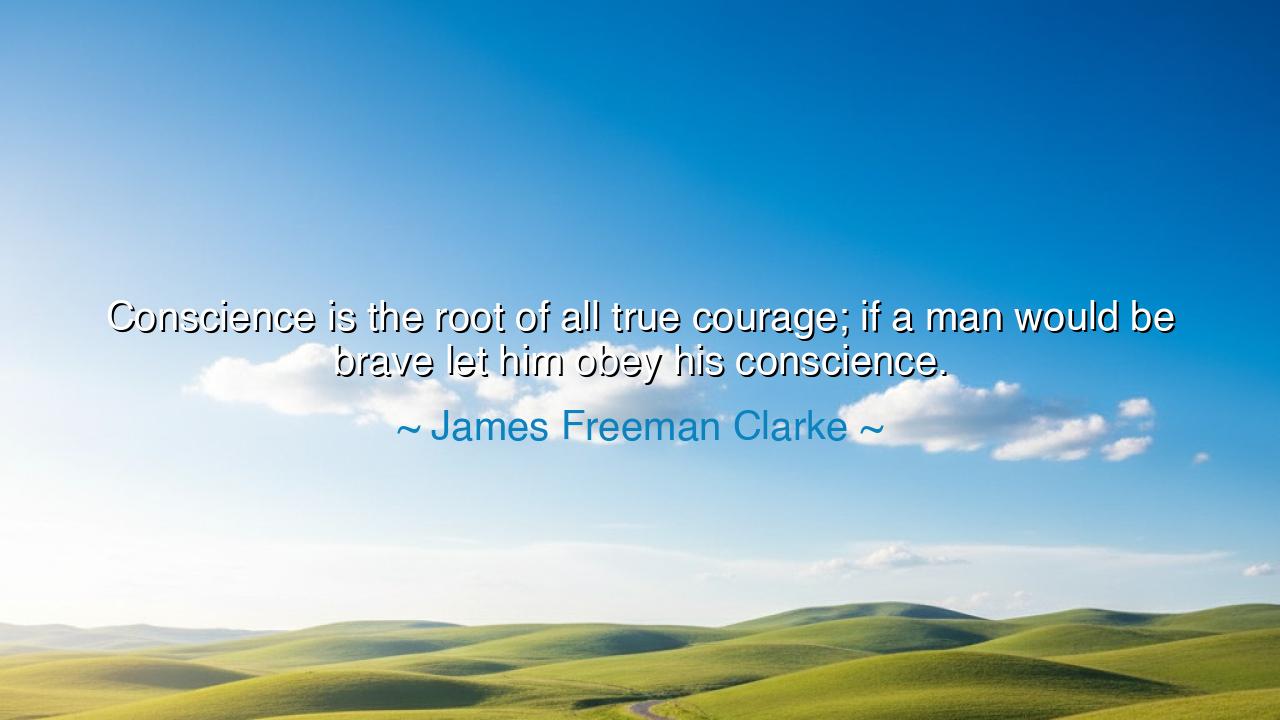
Conscience is the root of all true courage; if a man would be
Conscience is the root of all true courage; if a man would be brave let him obey his conscience.






The American theologian and philosopher James Freeman Clarke, a man devoted to truth and moral clarity, once proclaimed: “Conscience is the root of all true courage; if a man would be brave let him obey his conscience.” In these words lies a wisdom as deep as the ages, for he reveals that courage is not born of strength or pride, but of conscience—that inner voice which whispers what is right even when the world demands silence. The swords of the mighty may glitter, but it is the heart ruled by conscience that burns with the fire of true bravery.
To the ancients, conscience was not a mere thought or feeling—it was the divine spark within, the fragment of eternal truth that guided man through the storms of life. To obey that voice is to live in harmony with one’s highest nature; to ignore it is to descend into cowardice, no matter how loudly one boasts of strength. Courage, as Clarke teaches, is not reckless defiance, but the noble resolve to follow what is right, even when the path leads through pain, loss, or death. For the soul that obeys its conscience cannot be conquered—it stands firm though kingdoms fall and legions rage against it.
History offers countless examples of those who have chosen conscience over comfort, and in doing so have revealed the true nature of courage. Consider Socrates, the philosopher of Athens, who was condemned to death for corrupting the youth and questioning the gods of the city. Offered the chance to flee, he refused, saying that to escape would betray the laws he had lived by. He drank the hemlock calmly, faithful to his inner truth. His body perished, but his courage became immortal. Socrates’ strength did not lie in his words alone, but in his obedience to conscience—that sacred guide which forbade him to live dishonorably, even to save his life.
So too, in the modern age, we remember Martin Luther King Jr., who marched against hatred armed with nothing but faith and moral conviction. His conscience told him that justice and love must conquer prejudice and fear. Though threatened, imprisoned, and ultimately slain, he never abandoned that inner voice. His courage was not the courage of battlefields, but the courage to remain peaceful in the face of violence, to stand firm when the world demanded surrender. It was the same courage Clarke spoke of—the power that rises not from anger, but from righteousness.
For conscience is the root of all lasting bravery. Without it, courage is mere recklessness—a fire that burns bright but leaves only ashes. The tyrant may appear brave, but his heart trembles in secret, for he knows his deeds are built upon falsehood. The thief may act boldly, but it is the boldness of desperation, not virtue. Only the man or woman who obeys their conscience can walk through darkness without fear, for their light comes from within. Such courage cannot be taken by sword or silence—it is the courage of the soul itself.
To live by conscience demands sacrifice. It may cost you comfort, friendship, or the favor of the powerful. Yet it grants something infinitely greater: peace within. When a person acts against their conscience, even success turns bitter; but when they obey it, even failure becomes noble. The ancients called this the “armor of the soul”—to be so aligned with truth that no lie, no fear, no punishment can shake the spirit. That is what Clarke meant: that to be truly brave, one must first listen to that still, unwavering voice within.
Therefore, my children, let this wisdom guide your steps: when doubt arises and fear clouds your heart, listen to your conscience. It may speak softly, but its words carry the strength of the eternal. Obey it, even when the world mocks you; trust it, even when the cost is great. For true courage is not the roar of the fearless, but the quiet, steadfast obedience of the just.
And so remember: the bravest man is not he who conquers others, but he who conquers himself. The strongest fortress is not built of stone, but of conscience. Live by it, and you shall live free. Stand by it, and even when the world trembles, your soul will remain unshaken—rooted in the timeless courage that springs from the voice of truth within.






AAdministratorAdministrator
Welcome, honored guests. Please leave a comment, we will respond soon